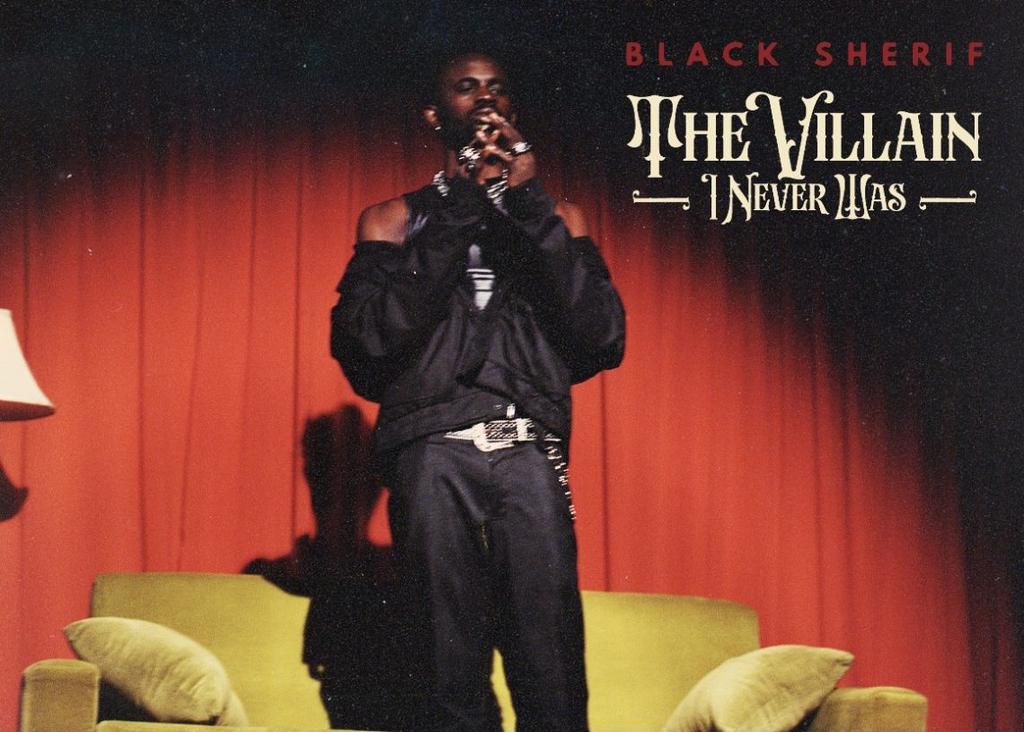On his debut album, ‘The Villain I Never Was,’ Black Sherif is like ‘The Solitary Reaper’ [Pulse Album Review]
)
He didn’t speak to her. But from a distance, he could see and feel her sadness and distress. Even though her song aimed to provide succour, it further elucidated her sadness and made it more visible.
Black Sherif: The Villain I Never Was

In April 2022, Pulse Nigeria profiled the rise of Black Sherif. But what Pulse didn’t particularly highlight at the time, was his brand of songwriting, which makes his songs read like short stories. He employs a dark, honest and philosophical approach to his storytelling, which emanates from the pain of his background and upbringing, and perhaps, the pain - and darkness - that he still carries and can’t seem to outrun, no matter how successful he gets.
He also applies his voice like Enya - not for voice type or for vocal range, but for how he needs not to try too hard to project pain. Say what you might, but this is an unusual or rare trait for an African pop star and hitmaker.
On October 7, 2022, he released his 14-track debut album, The Villain I Never Became. More than ever before, it was a nod to more of the darkness, which beckons from inside the Ghanaian star. Even when he discusses love between tracks 10 and 12, it was still from a standpoint of heartbreak and pain.

Speaking about the “villain” in his album title, Sherif told DadaBoy Ehiz on Africa Now that, “We as individuals are all connected in some way, and some way somehow we are all fighting different battles - internal, external - and with me everything I’ve learned or say are more like experiences, things I’ve seen or things I’ve seen people go through. With my life, I feel like sh*t bro. I feel like I’m fighting myself, and I’m a human, I need to feel like that sometimes. It shouldn’t always be up.
“All of the time I’m the villain - in my story, in people’s story - everywhere I’m the villain, but when I sit and think about it I know “Nah bro, I don’t just wake up to be a villain.” I’m fighting for my life, I’m trying to make sense, I’m trying to be a better person so I really wasn’t the villain that people paint me to be or that myself is telling me. I’m not the villain.”
He also tells Apple Music that, “Most of the words in the album are commands to my spirit, and [they tell] my story.”
This is an album about pain, strife, depression, struggle, building faith through lack of faith and finding happiness and light, while sadness and darkness beckon. Like ‘The Solitary Reaper,’ Sherif uses music as a coping mechanism for pain, and as catharsis, towards lasting healing.
When you hear all the pain that Sherif has gone through, and the debilitating doubt that might have emanated from that, you would understand how he might colour himself a ‘Soja (Soldier).’
In the song, he sings about how his anxiety, insecurities and inferiority complex are trying to kill him. He also sings, “I don’t feel okay, my heart is beating so fast.” Yet, he aims to stand and beat his chest like a warrior, to be prepared for success, while preventing everybody else from seeing his mental health struggles.
When you listen to songs like ‘The Homeless Song,’ ‘Kwaku The Traveller’ and the self-adulation of ‘Oil Dey My Head,’ you would understand the depth of Sherif's struggles. He probably didn’t expect to make it. But with no other path left to follow, he just seemed to keep going. Minus his mental health and psychological struggles, he was also homeless for a few months.
Even when he elevates himself with a nod to individuality on ‘Oil Dey My Head’ with self-assurance and sings that, “Victory is near,” he still can’t outrun his demons. He later sings, “Send them away, evil eyes dey watch me…”
On ‘Konongo Zongo,’ which gives his nod to his origins, he documents the flip side to his individuality, “I nor dey open up to nobody, I keep my yawa to my self, it’s only me…”
Perhaps, no evil watches him. Perhaps, he’s just lived in strife and the hustle for so long, that he doesn’t seem to understand how to totally settle into success. Perhaps, a part of him feels like he doesn’t deserve success, and that part of him probably feels like the success isn’t real.
For these reasons, he is like ‘The Solitary Reaper’ and ‘The Villian I Never Was’ is his melancholy strain. The career and life are the fields that he works on. And we, the audience, are William Wordsworth. We see Sherif’s attempt at happiness, but we also see the darkness, pain and paranoia that he can’t seem to escape.
Black Sherif: The Villain I Never Was II
Black Sherif is a unique blend. He is a product of Highlife, Hiplife, Reggae and Hip-Hop. His style is rooted in Highlife/Hiplife, his topical astuteness and Patois leaning are from Reggae/Dancehall while some of his beat choices are rooted in Hip-Hop, especially Drill and Emo.
While Black Sherif is best known for his Drill-esque flows, and while the beats on this album explore Drill, Trap, Reggae and Afro-pop, its foundation is melancholy, which also makes it an Emo album.
If you leave it at the beats, long stretches of this album could have been made by Lil Uzi Vert, Post Malone or XXXTentacion - three artists, who are known for their Emo leanings. In particular, songs like ‘45,’ ‘Soja’ and ‘Toxic Love City’ could have been made by any of those artists.
But with Sherif’s Reggae-infusion and his lyrical depth and philosophical leanings, he is also like Sting in the '80s, when he created Sting and The Police. But as an overall entity, Black Sherif is more like Post Malone, due to the numerous influences in his music, which then leans towards Hip-Hop. However, while Malone’s essence finds roots in Rock and Country, Sherif’s essence finds roots in Highlife and Reggae.
Another key difference between Malone and Sherif is that Malone tends to mostly create for memories and melodies, while Sherif’s music is laced with a lot of quotables.
Black Sherif: The Villain I Never Was III
That album sequence and progression of ‘The Villain I Never Was’ shares distant similarities with Asake’s Mr. Money With The Vibe. But you will only notice if you pay attention to detail and if you can see beyond the differences in style/brand of music.
Both albums are concise at 40 and 30 minutes respectively. Both albums also open with highly introspective moments and close with a popular single, possibly as a bonus. In the case of Sherif’s debut, it closes with two popular singles.
Nonetheless, ‘The Villain I Never Was’ could have been two tracks shorter. Although every track on this album is brilliant, some songs wouldn’t have been missed, if they had been cut. ‘Wasteman’ is one. The album should have also had just one of ‘Oh Paradise’ and ‘Don’t Forget Me.’
There is a reason why the album drags between ‘Wasteman’ and ‘Oh Paradise.’ ‘Toxic Love City’ should have also come earlier. But with the right foreign feature, the song could really be an international smash.
Final Thoughts
In the end, ‘Villain’ seems to be a two-pronged situation. The first was addressed with Sherif’s quotes earlier in this piece. But ‘villain’ could also relate to what his struggle could have made him, but one he never became.
The project is a diaristic chronicle of his rags-to-grace story, alongside other key elements of his life on that journey, but it needed one or two more features for illumination.
Black Sherif is dark. He can’t seem to outrun the lucid tendencies of his pain. Thus in his bright moments, it feels like he sings about melancholy. His happiness is not euphoric. It feels like yet another chronicle of darkness. Perhaps, it has to do with his voice type, cadences and technique.
But none of those factors stands alone. They chiselled everything into what we now know as Black Sherif and his unique melancholy strain, like The Solitary Reaper. Perhaps, he escaped the villainous path. Perhaps, he didn’t. But one thing is for sure: There is still a villain in there, somewhere.
Ratings: /10
• 0-1.9: Flop
• 2.0-3.9: Near fall
• 4.0-5.9: Average
• 6.0-7.9: Victory
• 8.0-10: Champion
Pulse Rating: /10
Album Sequencing: 1.3/2
Songwriting, Themes and Delivery: 1.8/2
Production: 1.8/2
Enjoyability and Satisfaction: 1.5/2
Execution: 1.5/2
Total:
7.9 - Victory

)
)
)
)

)
)
)
)
)
)
)
)
)
)